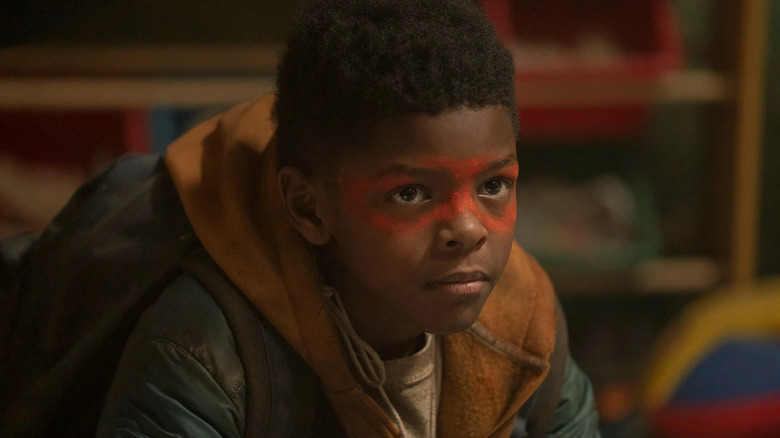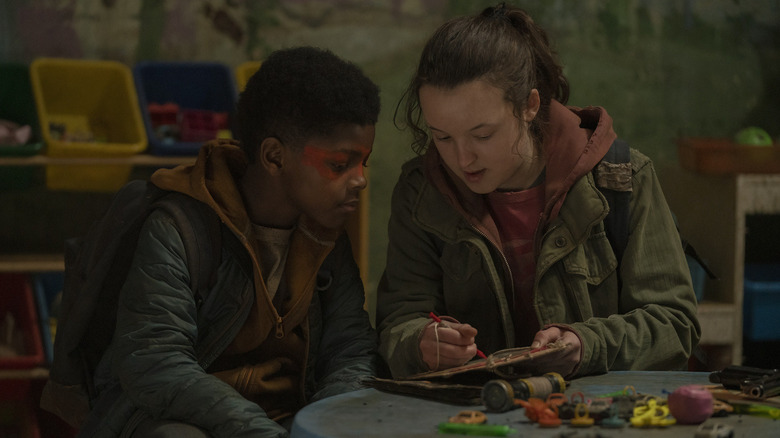
This post contains spoilers for "The Last of Us" episode 5.
The fifth episode of HBO's "The Last of Us" doesn't pull any punches when it comes to adapting the most devastating aspects of the video game. In the aftermath of their deadly fight against the resistance group in Kansas City, Joel (Pedro Pascal) and Ellie (Bella Ramsey) team up with Henry (Lamar Johnson) and Sam (Keivonn Woodard), two brothers running from the leader of the movement, Kathleen (Melanie Lynskey), who is out for blood. Their stories collide in the most exciting and heartbreaking way possible, culminating in an ending that leaves no tear duct unchecked. However, one thing stood out as a trickle of light in the darkness: superheroes.
"The Last of Us" is not about good versus evil. In fact, more often than not, the protagonists have to reckon with their misdeeds in the name of survival. In episode 5, this theme remains the same. Henry and Sam are a pertinent reflection of Joel and Ellie's growing relationship, and an early prediction of how the grizzled smuggler will eventually do anything to protect his surrogate daughter. Henry is running away from his past actions, which sent a good man to his death in order to save his little brother. But to Sam, Henry is the hero in his life, protecting him from the violent world around them, no matter the circumstance. In "The Last of Us," superheroes still serve as a source of inspiration in a grimdark reality.
Heroes Were Still Good

"The Last of Us" episode 5 puts the audience right beside Henry and Sam as they attempt to evade the vengeful forces searching for them day and night in Kansas City. The situation would be strenuous enough for anyone in their shoes, but Henry remains a steady presence for his little brother in the face of ultimate uncertainty. When the duo spends 10 days in a room, Sam takes the opportunity to decorate the place and paint pictures of him and Henry as superheroes. Not only does Sam see his older brother as an unwavering hero, but he envisions himself as a sidekick. To endure the brutality of a deteriorated world, the eight-year-old child draws power from superheroes of another time.
In the modern movie landscape, superheroes that navigate a gritty world are no longer a rare commodity. The black-and-white battles between heroes and villains are the remnants of a long-gone era, the pre-2010s, to be exact. To that point, HBO's "The Last of Us" takes place in 2003, instead of 2013 like in the video game. The post-apocalyptic world that the characters find themselves traversing is basically stuck in time, an era that saw the superhero medium at the peak of its inspirational powers. I wouldn't be shocked if Henry showed Sam "Superman: The Movie" at some point. However, the aspirational nature of superheroes is nothing more than an unattainable ideal in an endlessly cruel world.
The Cruel Reality

After Sam and Henry meet Joel and Ellie, the partnership gives both pairs a spark of hope for their journey out of Kansas City. Joel finds his less violent equal in Henry, a person willing to do almost anything to protect Sam and keep him healthy. Ellie finds a surrogate little brother of her own, who also shares an appreciation for comic books. As the two kids bond over their shared interests, Henry and Joel reach a philosophical understanding, even if the former does not outright admit it. Of course, the reality of their situation precedes any heroic intentions when Henry fails to keep Sam safe, and when Ellie is not able to heal her newfound friend.
When Sam draws his big brother as a superhero, he envisions Henry as someone willing to do anything to protect the ones he loves. But no one in the world of "The Last of Us" is a superhero, no matter how hard they try to be. Henry is not able to prevent the very thing he betrayed the resistance for. Meanwhile, Ellie trying to use her blood as "medicine" for Sam is representative of the larger mission at hand, and how it all may just be a pipe dream. Ellie putting "I'm sorry" on Sam's writing board is the epitome of the unrealistic pitfalls of superheroism. Instead of romanticizing superheroes, the latest episode of "The Last of Us" reinforces the message of its title.
Endure And Survive

When Joel and Henry make fun of the "endure and survive" tagline featured in the comic books, I couldn't help but chuckle. The quote is in fact redundant, a pairing of two synonyms done for dramatic purposes. However, the words ultimately still ring true for the show's messaging. Joel and Ellie have embarked on a cross-country journey that they were promised would be a world-changing effort. However, every step of the way so far, the only thing that has been proven is that the apocalypse does not treat superheroes nicely. Despite the inclinations of some characters, including Ellie, saving a broken world through a cure for the virus is not looking too great.
Although it may seem like it at times, Joel is not a superpowered individual. Since the first episode, "The Last of Us" has carefully curated his perspective on the matter: Joel is not here to save the world, nor anyone else other than Ellie. Slowly, but surely, he has shown signs of caring for the girl, but not because of some higher purpose. In a world where the infected are often the least of their problems, fighting, grinding, and waiting it out is the only true means of survival. In this post-apocalyptic scenario, the best anyone can do is just that — endure and survive. Neither Joel nor Ellie will get to be the superhero of their own story. HBO's "The Last of Us" has been explicitly telling us what the show is truly about and where it is headed, and the fifth episode is just the tip of the iceberg.
Read this next: 12 Things We'd Like To See In HBO's The Last Of Us
The post In The World Of The Last Of Us, Superheroes Are Still Aspirational appeared first on /Film.
